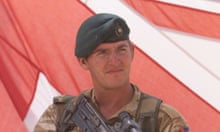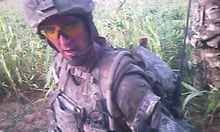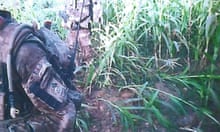A former Royal Marine who shot dead a wounded Taliban detainee may become a terrorist target when he is freed from prison next month, police have said.
Alexander Blackman and his wife Claire have been advised by police to take a series of precautions including changing their identities and moving house.
Blackman is expected to walk free in about two weeks after five senior judges quashed his conviction for murder, replaced it with manslaughter and sentenced him on Tuesday to seven years in prison. His release is imminent as he has already served three-and-a-half years.
The judges, sitting at the court martial appeal court, made it clear that they still regarded his crime as very serious and rejected the argument by his legal team that he should be allowed back into the military.
His uncertain future is also clouded by the security threat hanging over him and his wife, who led the campaign for his release.
In legal argument ahead of the appeal, Ms Blackman told the court police had advised her to take special security measures. They said the couple should consider changing their identities and moving. The court also heard that while in prison Blackman had on five occasions been told there had been intelligence of threats to attack him.
The revelations, which can only be reported now, emerged in legal argument about whether video showing the moment Blackman shot dead the wounded man in Afghanistan in 2011 should be released.
A Home Office security expert argued that if released the images could be used by Islamist terrorists to radicalise potential followers and could put lives of service personnel and British civilians in peril.
It is understood that other security measures suggested include:
That the Blackmans should have an operational name and codeword to ensure a quick police response if trouble arises.
Giving police a list of safe houses, with codenames.
Blackman always carrying a tracking device.
Maintaining zero online presence.
Police have also given Ms Blackman advice over what she should do if she feels she is being followed.
The resentencing in London was greeted with jubilation by Blackman’s many supporters, among them veterans of all ages, who had packed into the court room. Outside the steps of the court champagne corks were popped and bagpipes played.
Ms Blackman said: “We are overjoyed at the judges’ decision to significantly reduce Al’s sentence, such that he can be released imminently. This is the moment that we have all been fighting hard for. It is hard to believe that this day is finally here.” Blackman, who appeared via video-link from prison in Wiltshire, did not react initially but smiled after the judges left the courtroom.
His conviction was quashed by the court martial appeal court earlier this month after it heard he was suffering from a mental condition called adjustment disorder that substantially impaired his ability to make rational judgments.
The sentencing remarks, however, make it clear that the judges did not absolve him of all responsibility.
“This was a deliberate killing of a wounded man,” the judges said. “Although the appellant’s responsibility is diminished … he still retained a substantial responsibility for the deliberate killing.”
They said aggravating factors included “the effect of the appellant’s actions on the reputation and safety of HM armed forces”. The judges continued: “There can be no doubt that the way in which the appellant acted, knowingly in contravention of the Geneva conventions … has had a material adverse effect on the views many hold about the conduct of HM armed forces.
“The appellant’s actions can be used by the insurgency and others as evidence that the killing … was in breach of the values proclaimed for which the international security force and HM armed forces had been sent to Afghanistan.”
The judges also flagged up the “vulnerability of the insurgent”, the decision by Blackman to make sure the killing was not witnessed by a British helicopter that had been circling and the attempt to cover up what had happened.
Mitigating factors they took into account included Blackman’s outstanding record, his mental state and a perceived lack of leadership by his superiors. They said he should not be dismissed with disgrace – but nevertheless should not be allowed to rejoin the military.
Arguing for Blackman’s immediate release, Jonathan Goldberg QC asked the court to reflect on the question of why the incident in a “godforsaken field in Helmand” had captured the public imagination.
He said: “It is that the vast majority of right-thinking ordinary men and women in this country recognise that our way of life and our values and even perhaps our civilisation is today under threat as rarely before by dark forces, and that it is the courage and sacrifice of men like Marine A [his anonymised codename during his original court martial] without whom we would all be at the mercy of the new barbarians.”
Blackman’s court martial in 2013 heard how his patrol was tasked with assessing a Taliban fighter who had been badly injured by Apache helicopter fire. The marines disarmed him and dragged him to the edge of a field, where he was sworn at and mocked.
Once the Apache had gone and the marines had made sure they were out of sight of a British observation balloon, Blackman leaned in and shot the unarmed insurgent in the chest.
As the man’s body twitched, Blackman told him: “There you are, shuffle off this mortal coil, you cunt. It’s nothing you wouldn’t do to us.” Moments later, he told colleagues: “Obviously this doesn’t go anywhere fellas. I’ve just broken the Geneva convention.”
Champagne being drunk on the steps of the high court. pic.twitter.com/42z7SsdAO5
— steven morris (@stevenmorris20) March 28, 2017
Footage of the incident, which was captured by a head camera worn by one of Blackman’s team, was discovered by chance a year later by military investigators.
While in prison Blackman has been doing an Open University degree. He has helped organise sports events, counsels fellow inmates and teaches maths. When there was a disturbance at a prison he helped to quell it.
A source close to the campaign said Blackman had had job offers and was also considering writing a book about his experiences.
Former marine colonel Oliver Lee, who took over as Blackman’s commanding officer shortly before the shooting, welcomed the resentencing.
Lee has accused Blackman’s superiors of not supporting him properly. He said: “I am very pleased that Sergeant Blackman has now been dealt with justly and fairly. This has been my sole intention throughout these proceedings. My hope now is that the many lessons from this tragic case will be learned and the Royal Marines can look forward to another 350 years of highly distinguished service.”







